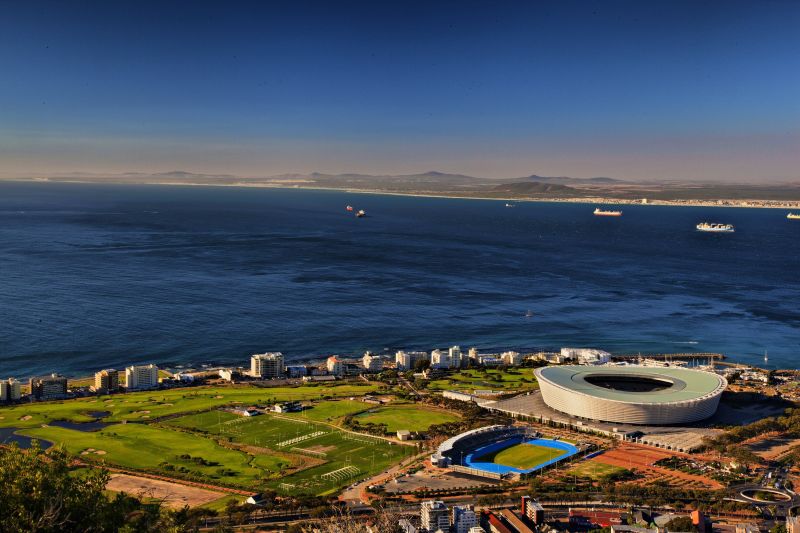ASU Center Director Addresses Cape Town's Water Apocalypse
Published on by Water Network Research, Official research team of The Water Network in Academic
Professor Dave White says crisis should serve as a 'wakeup call to all major U.S. cities'
Cape Town, South Africa is hurtling towards a water apocalypse with “Day Zero” — when authorities will turn off the taps — pegged for the first half of April.
By Marshall Terrill

Cape Town, Image via: GoodFreePhotos
The crisis, which has placed the city in peril, was caused by years of draught, insufficient and aging infrastructure, and population growth. To find out what this means for Cape Town residents and if a similar disaster could strike Phoenix, ASU Now turned to Dave White, a professor in the School of Community Resources and Development and director of Decision Center for a Desert City.
Question: Cape Town’s water crisis sounds apocalyptic. How did they get to this point?
Answer: The causes of Cape Town's water crisis are familiar to water managers in water-scarce cities around the world: limited supplies, dramatic population growth, aging and inefficient infrastructure, persistent drought, inadequate reservoir storage and climate change impacts.
The recent severe drought, which has lasted three years, was almost certainly made worse by the impacts of climate change, including rising temperature and declining precipitation. Our best scientific projections lead us to expect more frequent and extreme droughts in the future.
This crisis should serve as a wakeup call for cities around the world. These are among the very same challenges that we face in western U.S. cities like Phoenix, Las Vegas, Denver and Los Angeles. In the western U.S., our urban water systems have proved to be remarkably resilient, in part due to far-sighted planning, professional management and conservation, but there is clearly a pressing need to develop new innovative solutions (to) transition urban water systems to adapt to multiple interrelated stresses, including climate change.
Q: Water is now being rationed and limited in Cape Town. How long can they survive this crisis and how can they get their water reserves back?
A: Officials in Cape Town have capped water use at 50 liters (about 23 gallons) per person per day and, according to best estimates, only about half of households have met those targets. In contrast, residents in the Phoenix-metro area typically use between 50 and 150 gallons per person per day.
Such severe rationing directly affects residents' daily life by limiting indoor use for cooking and sanitation as well as outdoor use for landscaping. This rationing also increases risk for public health as people are not able to maintain proper hygiene. The current crisis has also negatively impact tourism to the region, which diminishes economic activity. 
ASU Professor David White,
Photo from ASU
Q: I’ve read reports that despite the gloomy prediction, Cape Town residents aren’t curbing their water use. What will this look like for them?
A: The reservoir system supporting Cape Town is projected to collapse on the so-called "Day Zero,” which is currently estimated to be April 12 but could be sooner. At that point, reservoirs will be only about 13 percent capacity but the remaining water is too filled with silt to be usable. Water deliveries will be limited to the most essential services such as hospitals. According to city officials, residents will have to obtain water from one of about 200 water stations around the city.
While everyone is hopeful that residents will pull together for the best interest of the communities, there is obviously cause for concern about social and political unrest and even violent conflict. The most vulnerable members of the community including lower income residents, elderly, and those with limited capacity to cope with the crisis will be at most risk and require special aid. Among other things, this issue highlights the implications of resource management not only for community sustainability but also for national security.
Q: What will it take for Cape Town to recover?
A: There are no easy solutions to the Cape Town water crisis. The city will need to implement dramatic conservation, upgrade its water infrastructure to reduce losses, and develop new supplies, potentially through coastal desalination, although that option is costly, energy-intensive, and takes time. There needs to be coordination across all levels of government, from federal to local, and across all sectors of the economy including public, private and non-governmental.
While Cape Town as one city cannot individually deal with the impacts of global climate change, this city, and South Africa in general, must push the global community to reduce the problem by dramatically reducing emissions that drive global warming and climate disruption.
Read full interview: ASU
Media
Taxonomy
- Resource Management
- Water Access
- Water Resource Mapping
- Integrated Urban Water Management
- Drought
- Sustainable Water Resource Management
- Urban Water
- Access
- Urban Water Supply
- Urban Water Infrastructure